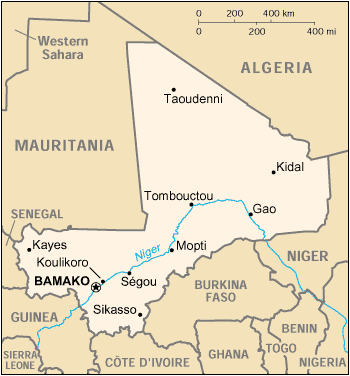2013 World News: Mali

Islamic Militants to Expand Their Control Over Mali; Presidential Election Mostly Peaceful
Al Qaeda in the Islamic Maghreb and Ansar Dine, radical Islamist groups that had been expanding their area of control in northern Mali, had pushed into the central part of the country by January, crossing into the area controlled by the government. France sent about 2,150 troops to Mali to push them back to the north. In addition to launching airstrikes on militant strongholds, France also deployed ground troops to combat the stubborn fighters. Soldiers from other African nations were also deployed to Mali to aid in the effort. France was widely praised for its success in forcing the militants out of central and southern Mali. The UN Security Council voted in April to deploy about 12,000 troops and police officers to Mali to stabilize the northern region, oversee the return to civilian rule, and to train Malian soldiers so the country's armed forces can resume security of the country. The troops arrived in early July 2013. The Tuaregs, the nomadic rebels who had taken over parts of the north and were briefly allied with Al Qaeda in the Islamic Maghreb and Ansar Dine, signed a ceasefire with the government in June 2013. They agreed to cede control of Kidal in the north. The peace deal set the stage for presidential elections, which were a prerequisite for an infusion of about $4 billion in international aid. The first round of the election was held in July, despite concern that the country was ill-prepared for them. Voting was largely peaceful. Ibrahim Boubacar Keita, a former prime minister and president of the National Assembly, won 39.2% of the vote, and former finance minister Soumaïla Cissé took 19.4%, necessitating a second round. Keita won in a landslide in the second round, which was held in August. —Beth Rowen |
- More from 2013 News of the World









